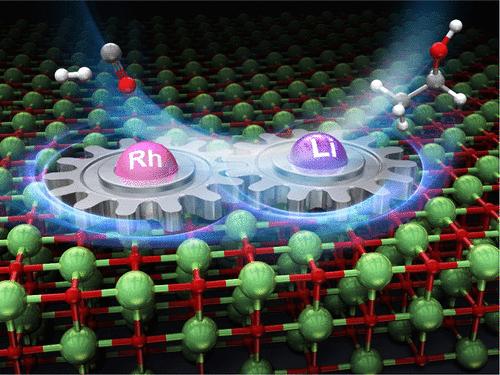Direct Syngas-To-Ethanol Conversion over Lithium-Promoted Rh/MgO Catalysts
IF 11.3
1区 化学
Q1 CHEMISTRY, PHYSICAL
引用次数: 0
Abstract
Significant efforts have been dedicated to the direct syngas conversion into ethanol, however, achieving a high ethanol yield remains a formidable task. In this study, we present the direct syngas-to-ethanol conversion over Li-promoted RhOx/MgO catalyst (RhOx/Li2O/MgO). The ethanol space-time yield (EtOH STY) and selectivity reached 12.2 mmol gcat–1 h–1 and 20%, respectively, at a 35% CO conversion over the RhOx/Li2O/MgO catalyst. The RhOx/Li2O/MgO catalyst demonstrated superior performance in terms of both ethanol selectivity and STY compared to Rh/Li2O catalysts on other support materials and Rh/MgO catalysts promoted with other alkali metals. In situ/operando spectroscopic techniques, combined with other characterisations and theoretical calculations, have elucidated the interactions between Li2O and Rh on the MgO surface. These interactions promote the formation of new active sites and weaken CO adsorption on the Rh surface, thereby enhancing ethanol production. This work provides a promising strategy for improving ethanol yield in syngas conversion processes.

锂促进的Rh/MgO催化剂上合成气直接转化为乙醇
在合成气直接转化为乙醇方面,人们已经做出了巨大的努力,然而,实现高乙醇产量仍然是一项艰巨的任务。在这项研究中,我们提出了锂促进的RhOx/MgO催化剂(RhOx/Li2O/MgO)直接合成气转化为乙醇。在RhOx/Li2O/MgO催化剂上,当CO转化率为35%时,乙醇时空产率(EtOH STY)和选择性分别达到12.2 mmol gcat-1 h-1和20%。与其他载体材料上的Rh/Li2O催化剂和其他碱金属上的Rh/MgO催化剂相比,RhOx/Li2O/MgO催化剂在乙醇选择性和STY方面都表现出了更好的性能。原位/operando光谱技术,结合其他表征和理论计算,阐明了MgO表面Li2O和Rh之间的相互作用。这些相互作用促进了新的活性位点的形成,减弱了CO在Rh表面的吸附,从而提高了乙醇的产量。这项工作为提高合成气转化过程中的乙醇产量提供了一个有前途的策略。
本文章由计算机程序翻译,如有差异,请以英文原文为准。
求助全文
约1分钟内获得全文
求助全文
来源期刊

ACS Catalysis
CHEMISTRY, PHYSICAL-
CiteScore
20.80
自引率
6.20%
发文量
1253
审稿时长
1.5 months
期刊介绍:
ACS Catalysis is an esteemed journal that publishes original research in the fields of heterogeneous catalysis, molecular catalysis, and biocatalysis. It offers broad coverage across diverse areas such as life sciences, organometallics and synthesis, photochemistry and electrochemistry, drug discovery and synthesis, materials science, environmental protection, polymer discovery and synthesis, and energy and fuels.
The scope of the journal is to showcase innovative work in various aspects of catalysis. This includes new reactions and novel synthetic approaches utilizing known catalysts, the discovery or modification of new catalysts, elucidation of catalytic mechanisms through cutting-edge investigations, practical enhancements of existing processes, as well as conceptual advances in the field. Contributions to ACS Catalysis can encompass both experimental and theoretical research focused on catalytic molecules, macromolecules, and materials that exhibit catalytic turnover.
 求助内容:
求助内容: 应助结果提醒方式:
应助结果提醒方式:


